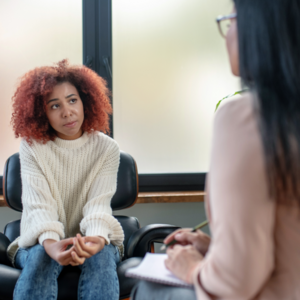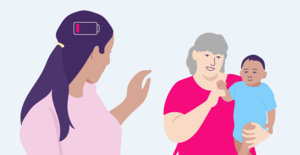When anxiety hits, it can feel like your mind and body are stuck in overdrive. Your heart races, your thoughts spiral, and even everyday tasks can feel impossible. Whether it’s creeping in gradually or showing up out of nowhere, anxiety can take a real toll on your well-being, relationships, and ability to function. And while it’s incredibly common, that doesn’t make it any less isolating.
The good news? You don’t have to wait months for relief or go through it alone. Seeking help — especially when symptoms start to interfere with your daily life — isn’t just brave, it’s necessary. The sooner you reach out, the sooner you can get the tools, support, and treatment you need to start feeling more like yourself again. Whether it’s your first time asking for help or you’ve been managing anxiety for a while, finding care quickly is a powerful first step toward feeling better.
How to know if you need to see a therapist for your anxiety
While occasional worry is part of life, certain signs mean your anxiety may need professional support — sooner rather than later:
- If you’re experiencing persistent panic attacks that come on suddenly and leave you feeling out of control, that’s a red flag.
- You might also notice that anxiety is making it hard to function at work, school, or in relationships — whether it’s avoiding responsibilities, missing deadlines, or withdrawing from others.
- Trouble sleeping or eating because of anxious thoughts or physical discomfort is another clear indicator.
- If you’re living with racing thoughts, constant chest tightness, or a sense of impending doom or dread that doesn’t go away, it’s time to seek help.
These symptoms can escalate if ignored. Reaching out for care is not a sign of weakness, but a critical move toward healing and reclaiming control.
If you’re in crisis or having thoughts of self-harm, don’t wait — reach out for immediate help. These moments can feel overwhelming and isolating, but you are not alone, and there are people ready to support you right now. If you're in danger of hurting yourself or someone else, call or text 988, the Suicide & Crisis Lifeline, for free, confidential support 24/7. You can also go to the nearest urgent care center or emergency room. Taking action in a moment of crisis is a powerful step toward safety and recovery, and there is no shame in getting the help you need.
Quick steps to find a therapist for anxiety
When anxiety starts to interfere with your daily life, finding the right therapist can make a world of difference. But the search itself can feel overwhelming, especially when you’re already struggling. The good news is that there are multiple ways to access support quickly, often with same-day or next-day availability. Here are some practical steps you can take right now to get connected with a therapist who understands anxiety and can help you manage it effectively:
Use online therapist directories: Psychology Today, TherapyDen, or Zocdoc are platforms that allow you to filter by specialty (such as anxiety), location, insurance accepted, gender preference, and appointment availability.
Try teletherapy platforms: Platforms like BetterHelp, Talkspace, or Amwell are convenient, confidential, and often offer sessions within a day or two — perfect for those who need fast support from home.
Check with your insurance provider: You can use your member portal or call your plan to find in-network therapists. Don’t forget to ask about virtual therapy options or any coverage for telehealth mental health visits.
Explore local urgent care or mental health clinics with Solv: Many urgent care centers now offer mental health screenings and evaluations. Community health centers may also have mental health providers with shorter wait times.
Ask for a referral: Talk to your primary care doctor, a trusted friend, or a school counselor. If you’re employed, your workplace may offer support through an Employee Assistance Program (EAP) with free short-term counseling or referrals.
No matter where you start, taking that first step toward finding help is a strong and meaningful move toward feeling better.
What to expect from your first session with an anxiety therapist
Your first session with an anxiety therapist is typically focused on getting to know you and understanding how anxiety is showing up in your life. This intake and evaluation process may include questions about your current symptoms, when they started, possible triggers, your sleep patterns, lifestyle, and any past mental health history. Don’t worry about having all the answers — your therapist is there to guide you through it and create a safe space for you to share.
Together, you’ll begin setting goals and expectations for therapy — whether it’s reducing panic attacks, improving sleep, managing social anxiety, or learning how to cope with specific stressors. Your therapist may also introduce you to different therapy approaches that can help, such as cognitive behavioral therapy (CBT) to challenge anxious thinking, mindfulness-based therapy to calm your nervous system, or exposure therapy if you’re working through specific fears. This first session is a starting point for building trust and creating a plan tailored to your needs.
Can’t get an appointment right away? Try these stop-gap strategies while you’re waiting
If you’re struggling with anxiety but can’t get a therapy appointment right away, there are still meaningful ways to support yourself in the meantime:
- Start by reaching out to mental health crisis lines or warmlines for immediate, confidential support. You can call or text the 988 Suicide & Crisis Lifeline, use the Crisis Text Line by texting 741741, or connect with a local warmline for non-emergency emotional support. These services are free and available 24/7.
- In the moment, try grounding techniques to calm your mind and reconnect with your body. The 5-4-3-2-1 method (naming 5 things you see, 4 you can touch, 3 you hear, 2 you smell, and 1 you taste) can reduce spiraling thoughts, while deep breathing or guided meditation can lower your stress response.
- Journaling is another powerful tool — writing down your thoughts, using a mood tracker, or completing thought records can help you process what you're feeling. Mental health apps like Calm or Headspace offer structured support for managing anxiety between sessions.
- Finally, stay connected. Reach out to a supportive friend or family member and let them know what you’re going through. You don’t have to face anxiety alone — even small conversations can lighten the emotional load and remind you that help is on the way.
How to choose the right therapist for anxiety
Finding the right therapist can make a big difference in how supported and effective your treatment feels:
- Start by looking at credentials — qualified mental health professionals may include a Licensed Clinical Social Worker (LCSW), Licensed Professional Counselor (LPC), Psychologist (PhD or PsyD), or a Psychiatrist (MD or DO) if you’re considering medication.
- Equally important is their specialty — look for someone who has specific experience treating anxiety disorders, and possibly related areas like panic attacks, trauma, OCD, or phobias. Many therapists list this information in their bios or online profiles.
- Remember, you’re allowed to shop around. If, after a few sessions, you feel like the connection isn’t there or the approach doesn’t match your needs, it’s okay to try someone else. The right fit can take time, but it’s worth it — therapy works best when you feel safe, understood, and actively engaged.
Get connected to mental health support near you
You don’t have to wait weeks to start feeling better. Use Solv to find urgent care centers and mental health clinics near you with same-day or next-day appointments. Whether you’re dealing with overwhelming anxiety or just need someone to talk to, getting help quickly can make all the difference.
FAQs
How can I tell if my anxiety is severe enough to seek professional help?
You may need professional help for your anxiety if you're experiencing persistent panic attacks, if anxiety is making it hard for you to function at work, school, or in relationships, if you're having trouble sleeping or eating due to anxious thoughts or physical discomfort, or if you're living with racing thoughts, constant chest tightness, or a sense of impending doom or dread that doesn't go away.
What should I do if I'm in crisis or having thoughts of self-harm?
If you're in crisis or having thoughts of self-harm, it's important to seek immediate help. You can call or text 988, the Suicide & Crisis Lifeline, for free, confidential support 24/7. Alternatively, you can go to the nearest urgent care center or emergency room.
How can I find a therapist who specializes in treating anxiety?
There are several ways to find a therapist who specializes in treating anxiety. You can use online therapist directories such as Psychology Today, TherapyDen, or Zocdoc. You can also try teletherapy platforms like BetterHelp, Talkspace, or Amwell. Checking with your insurance provider or exploring local urgent care or mental health clinics with Solv are other options. Lastly, you can ask for a referral from your primary care doctor, a trusted friend, or a school counselor.
What can I expect from my first session with an anxiety therapist?
During your first session with an anxiety therapist, they will focus on getting to know you and understanding how anxiety is affecting your life. They may ask questions about your current symptoms, when they started, possible triggers, your sleep patterns, lifestyle, and any past mental health history. You'll also start setting goals and expectations for therapy, and your therapist may introduce you to different therapy approaches that can help.
What can I do to manage my anxiety while waiting for a therapy appointment?
If you can't get a therapy appointment right away, there are several strategies you can use to manage your anxiety in the meantime. These include reaching out to mental health crisis lines or warmlines for immediate, confidential support, using grounding techniques to calm your mind and reconnect with your body, journaling to process what you're feeling, and staying connected with supportive friends or family members.











